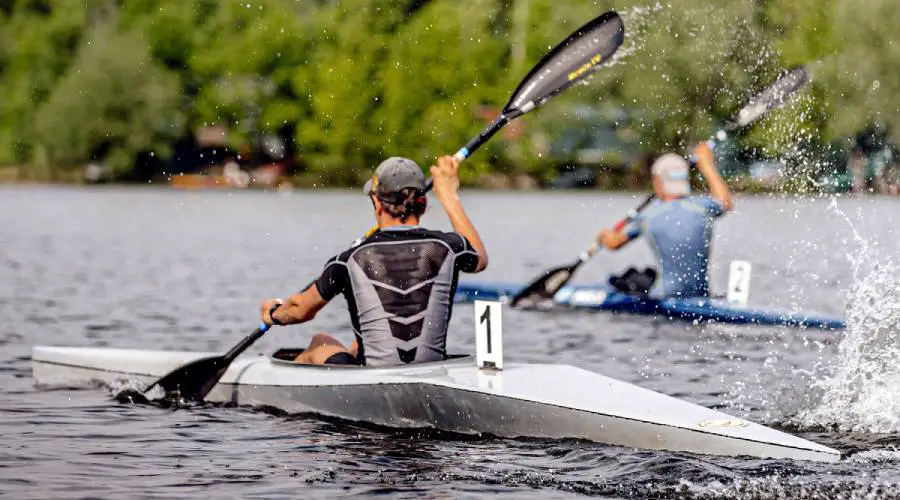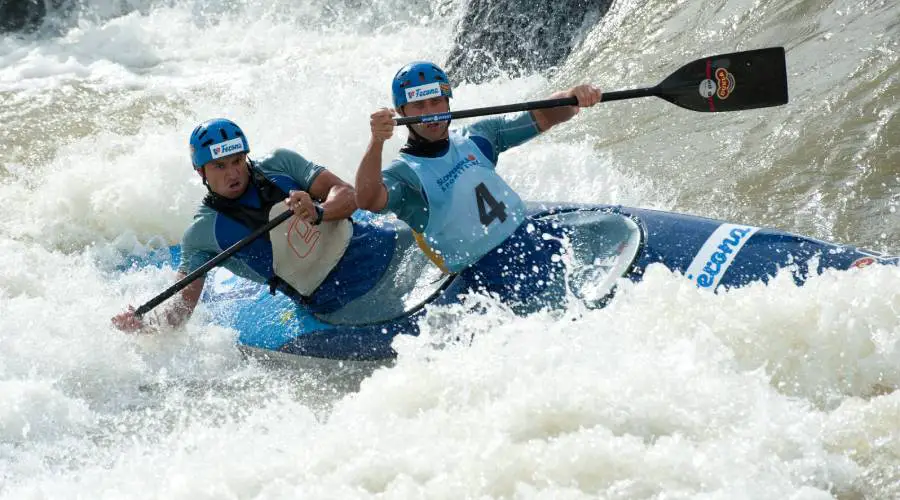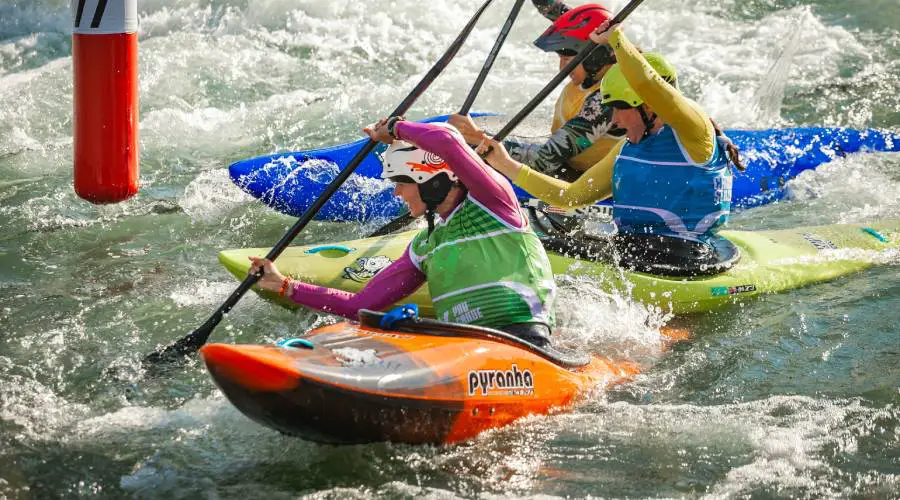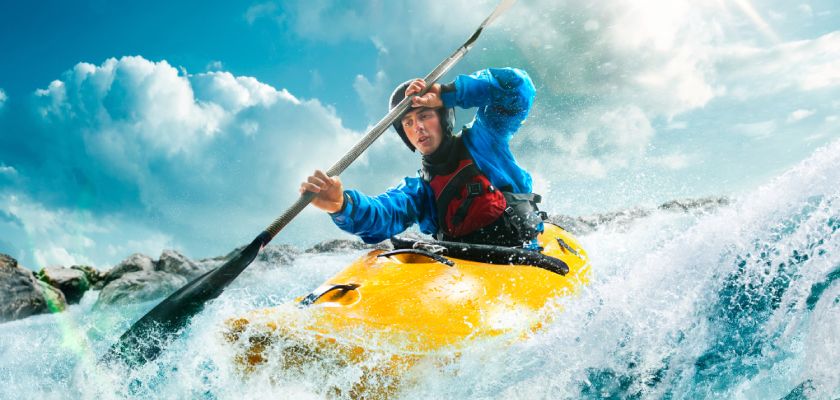Canoeing has a universe full of technical and specific terms used to understand how the sport works and what its rules are, both in practice and in theory.
With this in mind, we’ve developed a canoeing glossary full of terms you need to know as soon as possible. This water sport requires a lot of understanding not only from its fans, but also from those who are just watching.
Therefore, spectators should also get more information to be able to understand what is happening with the athletes and their canoes while watching the competitions.
So, if you like canoeing or simply sympathize with the sport, you need to know more about the sport’s vocabulary to make the experience even more complete!
It’s worth noting that it’s interesting for spectators to know the main themes of canoeing. But understanding is crucial for paddlers or aspiring paddlers to understand the sport as a whole.
The terms we’re going to cover in the glossary of canoeing range from types of currents and tides, to issues of stability and buoyancy of your canoes or kayaks. It is therefore very important to have a full knowledge of what is described in the canoeing glossary, especially for safety reasons.
So, if you like the sport, whether practicing or just watching, check out our glossary of canoeing and get to know how the sport works.
Join our free Whatsapp community and receive daily tips, news and trivia on more than 50 sports! Click here to join.

Canoeing glossary: complete list of terms
- Aduela
- Downpipe
- Emptying pump
- Bulb
- Trim
- Payload
- Crankcase
- Hull
- Cockpit
- Current
- Drift
- Primary stability
- Secondary stability
- Buoyancy
- Hydrodynamics
- Iça
- J-Strokes
- Kayak
- Rudder
- Marolas
- Footprint
- Balance point
- Redemption
- Rotation
- Skeg
- Spray skirt
- Helmsman
- Traction
- Yaw
Canoeing glossary: understand what the terms mean
Stave
In canoeing, stave is the name given to the wooden or metal structure that shapes the hull of a canoe or kayak.
Downpour
The act of keeping the boat parallel to the current is called a downpour in canoeing.
Drain pump
The emptying pump in canoeing is basically the device used to remove the water that enters a canoe or kayak, ensuring the safety of the paddlers.
Bulb
In canoeing, we also know the term bulb, which is the thickest point on a paddle blade.
Trim
In the world of canoeing, trim is the slope of the waterline of a canoe or kayak.
Payload
This term is very important to know: payload means the maximum weight that a canoe or kayak can safely carry.
Crankcase
In canoeing, the crankcase is the central part of a canoe’s hull.
Hull
The hull is the external structure of the boat, which can be made of wood, plastic, fiberglass and other resistant materials.
Cockpit
The cockpit, in canoeing, is nothing less than the seating area of a kayak, where the athlete will spend most of their time.
Current
Current is the name given to a flow of moving water, which needs a lot of attention from paddlers.
Drift
The term drift is the lateral movement of a vessel due to current or wind.
Primary stability
Primary stability, in canoeing, is the ability of a boat to remain stable in normal water conditions.
Secondary stability
Secondary stability means the ability of a vessel to regain stability after being tilted.
Buoyancy
Buoyancy is the ability of a boat to remain on the surface of the water.
Hydrodynamics
In canoeing, hydrodynamics is the study of the movement of fluids, such as water, in relation to the objects that move through them.

Hoist
Hoisting, in canoeing, is the act of raising or lowering a sail in a sailing kayak.
J-Strokes
The term J-Strokes in canoeing is given to a paddling technique that involves a combination of traction paddling and direction correction.
Kayak
A kayak is a type of boat similar to a canoe, but with an enclosed cabin where the paddler sits.
Rudder
In canoeing, a melee is a steering device that is attached to a canoe or kayak.
Ripples
Ripples are small waves that form on the surface of the water.
Footprint
The footprint is simply the part of the paddle blade that comes into contact with the water during paddling.
Balance point
A balance point is a point on the hull of a boat where it remains balanced.
Rescue
Rescue, as the name implies, is the procedure of helping a rower or boat that is in difficulty.
Rotation
Rotation is the movement of the rower’s body during the stroke, thus generating more force and efficiency.
Skeg
The skeg is a small retractable rudder used to help with the directional stability of a kayak.
Spray skirt
The spray skirt is an adjustable cover used to cover the cockpit opening of a kayak.
Helmsman
Helmsman is the person responsible for steering a ship.
Traction
Traction is the force exerted by the paddle blade on the water to propel the boat forward.
Yaw
Yaw is the lateral deviation of a boat from its desired trajectory due to factors such as wind or current.
Glossary of canoeing:
- Aduela
- Downpipe
- Emptying pump
- Bulb
- Trim
- Payload
- Crankcase
- Hull
- Cockpit
- Current
- Drift
- Primary stability
- Secondary stability
- Buoyancy
- Hydrodynamics
- Iça
- J-Strokes
- Kayak
- Rudder
- Marolas
- Footprint
- Balance point
- Redemption
- Rotation
- Skeg
- Spray skirt
- Helmsman
- Traction
- Yaw

Now that you know all the main terms used in canoeing, it’s time to check out our other content on this and many other sports. Here you have access to materials, lists, rankings, glossaries, news and much more about the world of sport.
Find out all about canoeing, basketball, soccer, fencing, artistic gymnastics, volleyball, boxing, bodybuilding, surfing, skateboarding and much more! We also have special articles on the Olympics and the Paralympics, so don’t leave the page now!
If you enjoyed learning about the glossary of canoeing, let us know in the comments what you thought of it! Don’t forget to also suggest other topics related to the world of sport that you’d like to see here.



